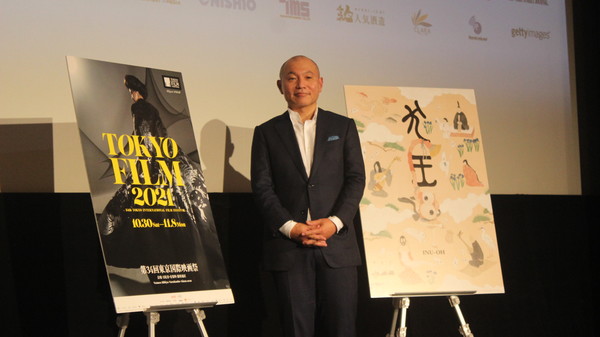Interest
Director Masaaki Yuasa Wants INU-OH To Be a Positive Story About Disability
posted on by Kim Morrissy
INU-OH director Masaaki Yuasa spoke about his inspiration behind the film at its Japan premiere at the Tokyo International Film Festival (TIFF). The film, which depicts the friendship between a blind biwa player and the eponymous Noh performer Inu-Oh, was Yuasa's attempt to tell a story lost to time. He hopes that audiences can see it as a positive story about disability and living true to oneself.

According to Yuasa, the fundamental theme is expressed through the character of Inu-Oh himself: although he is initially feared because his physical appearance is considered grotesque, he discovers his talent for dancing and becomes a star performer. Yuasa finds his upbeat attitude inspiring.
"He doesn't let the opinions of others weigh him down. I'm really attracted to that kind of outlook," he said. "Through Inu-Oh's dancing, I really want the audience to feel like they want to dance too. It's that same invigorating feeling I get from attending a live performance."
What particularly struck Yuasa about the story of the historical figure of Inu-Oh was how he was pressured to conform to a certain "correct" style of Sarugaku Noh. This inspired Yuasa to dig into the idea that there were multitudes of diverse experiences that were ignored in the creation of an "approved" history. By telling a fictional story around an Inu-Oh that the records do not acknowledge, Yuasa hoped to convey the existence of the marginalized, whose stories have been flattened or erased in the telling of history.
"I like stories about history's losers," he said. "For me, it's kind of an assurance. Even if history does not remember them, within the span of their own lives, there were surely people who understood them. That's meaningful to us in the modern day as well. Everyone needs someone who understands them."
Self-affirmation and choosing one's own identity are also big themes of the film. The main characters change appearances and names multiple times throughout the story, and for them the act of choosing their own name becomes a way of resisting the labels pushed onto them by the world around them. Yuasa hopes that audiences can ultimately see it as an uplifting story.
The film, which is inspired by Hideo Furukawa's Heike Monogatari: INU-OH no Maki (Tales of the Heike: INU-OH) novel, made its world premiere in the 78th Venice International Film Festival in September. The Japan premiere was held at TIFF. It will have a wider release in Japan in early 2022 after originally being scheduled for 2021.
Source: Tokyo International Film Festival Q&A Event